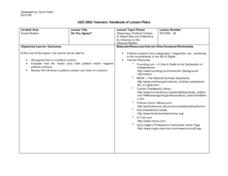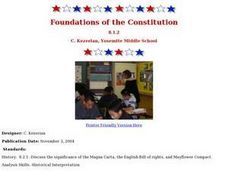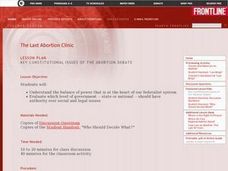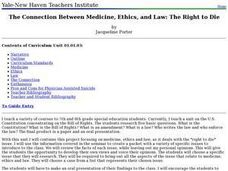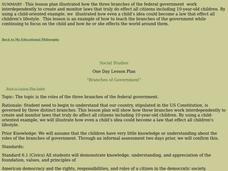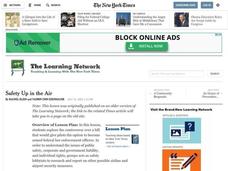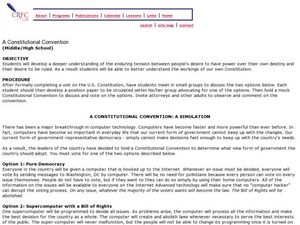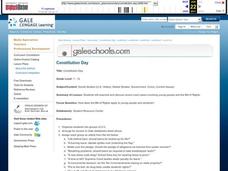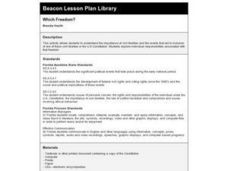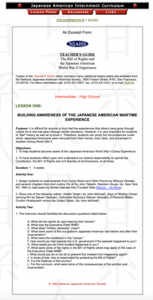Curated OER
Ask Me What's Great About America
Students pretend to be citizens of a new space colony and have been elected to the Intergalactic Senate to consider adding a Bill of Rights to the Constitution. They break into groups and discuss what seems unfair and fair about the...
Curated OER
Judicial Review
Students are introduced to the concept of judicial review. They read an article about this topic and the Bill of Rights. They answer discussion questions and review as a class.
Curated OER
Do You Agree?
Students recognize bias in a political cartoon, evaluate how the media uses both positive and/or negative political cartoons, and assess the influence a political cartoon can have on a person.
Curated OER
How a Bill Becomes a Law
Students make a chart on what they learned about how a bill becomes a law. In this law making lesson plan, students research the authority and restrictions placed on Congress on how they make a bill into a law and then present their...
Curated OER
Foundations of the Constitution
Eighth graders explore the Magna Carta and the Mayflower Compact.
Curated OER
The Last Abortion Clinic: Key Constitutional Issues of the Abortion Debate
Students discuss the Constitution of the United States and its amendments, then apply this discussion by creating a "Who should Decide What?" list, based upon their ideas about whether controversial issues such as abortion and medical...
Curated OER
The Connection Between Medicine, Ethics, and Law: The Right to Die
Students in a special education class examine the United States Constitution. Using the text, they answer five research questions and discuss the amendments that concern medicine, ethics and law of the right to die issue. They develop...
Curated OER
Foreign War and Domestic Freedom: A Delicate Balancing Act
Students investigate civil liberties in the U.S. They watch and discuss a PowerPoint presentation, conduct research on an event from a timeline, complete a worksheet, take an ideology quiz, and conduct a debate.
Curated OER
Branches of Government
Students explore the three branches of government. In this government and U.S. history lesson, students listen to a story about a boy who attempts to sponsor a bill to ban cartoons. Students interview three teachers who each represent...
Curated OER
Constitution
Ninth graders simulate a U.S. Supreme Court hearing concerning a First Amendment case about school prayer by participating in a hearing.
North Carolina Consortium for Middle East Studies
Federalists v. Anti‐Federalists
Here is a solid lesson plan to support your instruction on the Continental Congress and the Articles of Confederation. It includes close analysis of primary source images, a guided notes template and answer key, and many key points to...
Curated OER
Safety Up in the Air
Students explore the controversy over a bill giving pilots the option to become armed federal law enforcement officers. They brainstorm other possible security measures for airplanes and airports.
Curated OER
Understanding James Madison The Father of the Constitution
Learners research James Madison and create a table of his strengths and weaknesses. For this James Madison lesson, students read Jean Fritz's, The Great Little Madison, while developing their research skills, vocabulary strategies, and...
Curated OER
What Makes Us Free?: Maine's Declaration of Rights
Students analyze Maine's Declaration of Rights. They review state constitutions and declaration of rights and their importance. They analyze a section of Maine's Declaration of Rights and crete their own declarations of rights. They...
Curated OER
A CONSTITUTIONAL CONVENTION: A SIMULATION
Pupils discuss two computerized options to change the current U.S. government. In this Constitutional Convention lesson plan, students write a statement advocating for one of the choices and participate in a mock modern Constitutional...
Curated OER
Declaration of Independence
Students explore the US Constitution. In this Bill of Rights lesson, students work in pairs to select and examine amendments to the Bill of Rights. Students will identify what the amendment means, why they chose it, what it protects, and...
Curated OER
Blasphemy: Salman Rushdie
High schoolers discover the definition of blasphemy and examine examples of it in history. In this blasphemy instructional activity, students listen to their instructor present a lecture regarding details of blasphemy throughout history....
School Improvement in Maryland
Dividing the Powers of Government
Who does what? To develop an understanding of the balance of power between the US federal and state governments, class members research responsibilities in terms of legal systems, security issues, economic activities, lawmaking, and...
Center for Civic Education
What Is Authority?
Young scholars examine the concepts of power and authority as they begin learning about government in this elementary social studies lesson. Through a series of readings, discussions, and problem solving activities, children learn about...
Curated OER
Constitution Day
Students examine and discuss recent court cases involving young people and the Bill of Rights.They use a focus question to create the context for class discussion: How does the Bill of Rights apply to young people and students?
Curated OER
Which Freedom?
Fourth graders choose on the freedoms in the Bill of Rights and research it on the internet. They answer specific questions using their research and produce a written document using a computer.
Curated OER
Building Awareness of the Japanese American Wartime Experience
Pupils research the Japanese American World War II Camp Experience. They discuss the experience in the context of civil rights and the Bill of Rights.
Curated OER
In His Own Words: James Madison On the Problem of Faction
Students are introduced to the writings of James Madison and explain why he is often called "The Father of the Constitution". Using primary source documents, they examine his view of the Bill of Rights and what he meant by faction. In...
Curated OER
Electoral Process and Political Leadership
Students analyze voting issues. In this Bill of Rights lesson, students read articles regarding the election of 1824, government in ancient Rome, and lack of voter participation. Students discuss their impressions of each of the articles.




